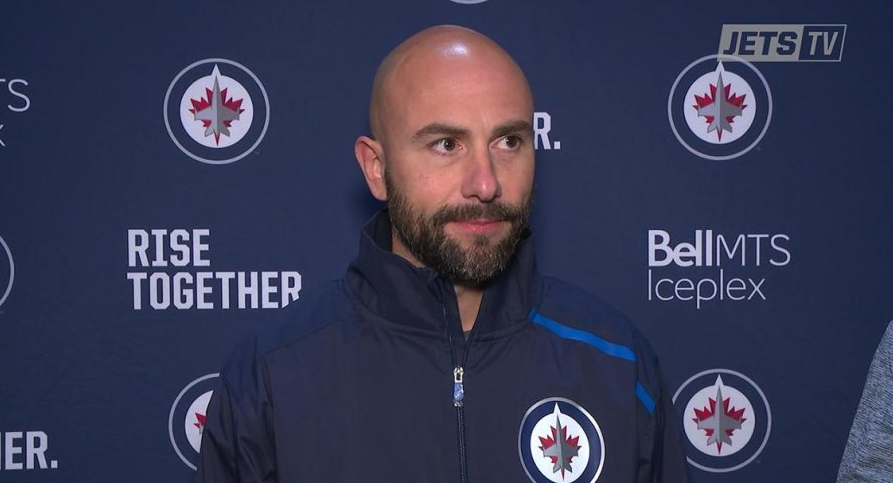
Canadiens’ Powerhouse Makes Honest Statement About Important Aspect His Games
As the Montreal Canadiens’ rookie camp unfolded, it quickly became clear that one of the standout performers was Florian Xhekaj, a young player who made a notable impact with his blend of physicality and skill. The Canadiens’ camp, designed to evaluate the talent and potential of their emerging prospects, saw Xhekaj making an impression that was hard to overlook. His performance not only highlighted his understanding of his role on the ice but also showcased the multifaceted nature of his game.
Coach Pascal Vincent, embarking on his first season as head coach of the AHL’s Laval Rocket, was asked on the opening day of the camp about his expectations for the young players. His response was both straightforward and insightful. Vincent emphasized the importance of seeing what each player brings to the table, underscoring that there’s a reason they are at the camp or were drafted by the team. “There’s a reason why they’re here,” Vincent remarked. “There’s a reason why somebody at some point said: ‘Yes, we’re going to bring you to camp or we’re going to draft you,’ whatever it is. There’s a reason why you’re going to wear that jersey that day and we want to see it. We want to see what you’re good at.”
For Florian Xhekaj, this meant demonstrating his physicality and skill in a way that would capture the attention of coaches and scouts. Known for his toughness and ability to make his presence felt on the ice, Xhekaj did not disappoint. His physical style of play, reminiscent of his older brother Arber Xhekaj who is already a defenceman for the Canadiens, was on full display. It was no surprise when Florian Xhekaj engaged in a fight during the camp, showing that he is not just a player who can contribute offensively but also someone who can impose himself physically.
Coach Vincent’s comments about fighting, or rather the lack of instruction to engage in fights, were telling. “We don’t talk about fighting,” Vincent explained, meaning that the coaching staff does not explicitly tell players to fight. Instead, the decision to engage in such activities is left to the players themselves. This approach allows players to exhibit their understanding of the game and their ability to make decisions in high-pressure situations. Xhekaj’s choice to fight in a moment he felt was appropriate was a demonstration of his confidence and awareness of his role on the ice.
Vincent’s praise of Xhekaj’s ability to both fight and score was significant. “That was his decision. But then it set the tone,” Vincent said. “It shows to everyone, I can do that, too. I know he scored like 30-some goals last year, so he can play. He’s a player. But if he has that tool in his pocket that’s pretty good.” This comment highlighted the dual threat that Xhekaj poses—a player who can contribute offensively and also stand up physically when needed. Vincent’s acknowledgment of Xhekaj’s goal-scoring ability, alongside his willingness to engage physically, underscores the value of having a player who can fulfill multiple roles effectively.
Xhekaj’s offensive skills were particularly evident in his performance. He had a standout season last year, scoring over 30 goals, which demonstrates his capability as a forward. His ability to balance physicality with offensive production makes him a versatile asset for the Canadiens. This blend of skills is something that coaches and scouts highly value, as it allows players to impact games in various ways. Xhekaj’s performance at the rookie camp was a testament to his development and readiness to take on more significant challenges in his hockey career.
Coach Vincent’s approach to evaluating players, focusing on what they bring to the game rather than imposing specific roles or expectations, is indicative of a broader philosophy in player development. By allowing players like Xhekaj to showcase their skills and make decisions on the ice, Vincent is providing them with the freedom to express themselves and prove their worth. This method can be highly effective in identifying players who not only possess the technical skills needed to succeed but also have the mental acumen and understanding of the game.
The dynamic nature of Xhekaj’s performance at the rookie camp is reflective of the evolving expectations for players in today’s game. The ability to contribute in multiple facets—whether through physicality, scoring, or defensive play—is increasingly important. Xhekaj’s performance illustrates how players must adapt and excel in various aspects of their game to make a lasting impression.
As the camp progresses and the players continue to compete for a spot on the team, Xhekaj’s blend of physicality and skill will likely be a key factor in his evaluation. His performance not only highlights his readiness to take on a significant role but also demonstrates his understanding of what it takes to succeed at higher levels of competition. With his ability to make an impact both offensively and physically, Xhekaj is positioning himself as a player to watch in the Canadiens’ system.
However, Florian Xhekaj’s performance at the Canadiens’ rookie camp showcased his dual-threat capability as both a physical presence and a skilled offensive player. Coach Pascal Vincent’s emphasis on allowing players to demonstrate their abilities and make decisions on the ice was evident in Xhekaj’s approach to the camp. By engaging physically and contributing offensively, Xhekaj not only fulfilled his role but also set a tone for his future in the Canadiens’ organization. His impressive showing is a clear indicator of his potential and readiness to take on more significant challenges as he continues his hockey career.

Leave a Reply